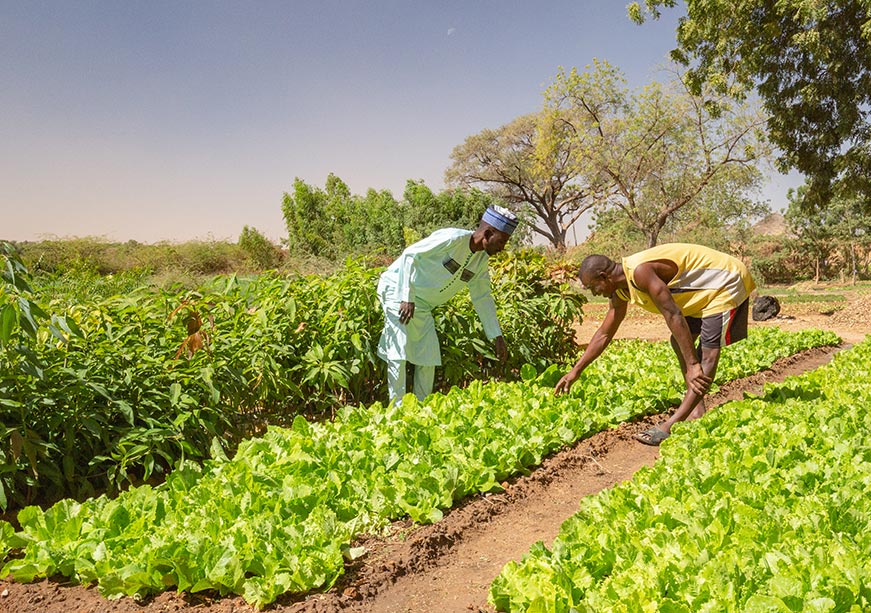-
CENTRES
Progammes & Centres
Location
Problems in nutrition security in the rural communities of Africa and India signal the need for a focus on agrobiodiversity to empower local farmers

Image Source: Getty
The lack of agricultural biodiversity in farming systems threatens nutritional security for nearly 3 billion people in India and Africa. When agricultural systems lack diversity, they become more vulnerable to pests, diseases, and environmental stresses, leading to reduced yields that limit access to a variety of nutritious foods. Additionally, monoculture practices can degrade soil health and ecosystem resilience over time, further compromising food production and long-term food security. The constriction of people’s access to diverse and nutrient-rich food due to a lack of agricultural biodiversity contributes significantly to malnutrition in regions like India and Africa.
In India, approximately 224.3 million people are undernourished, while in Africa, the number stands at 278 million as of 2021. These staggering figures underscore the urgent need to address underlying factors contributing to food insecurity and malnutrition through the promotion of agricultural biodiversity, diversified and regenerative farming practices, and improved access to nutritious foods for all segments of society.
The constriction of people’s access to diverse and nutrient-rich food due to a lack of agricultural biodiversity contributes significantly to malnutrition in regions like India and Africa.
Agricultural biodiversity encompasses the vast array of plants, animals, and microorganisms utilised in agriculture and food production, showcasing the richness and resilience of ecosystems cultivated by generations of farmers.
Firstly, agrobiodiversity provides a rich source of nutrients and dietary diversity. Traditional crops and local varieties often have higher nutritional value than commercial monocultures. For example, indigenous varieties of millets, sorghum, and pulses in India and Africa are often more resilient to adverse environmental conditions and are rich in essential nutrients like iron, zinc and calcium. By promoting the cultivation and consumption of these diverse crops, rural communities can address malnutrition and achieve better overall health outcomes.
Secondly, agrobiodiversity contributes to ecosystem resilience and sustainability. Diverse farming systems are more resilient to pests, diseases and climate variability and promote sustainable agriculture.
Moreover, agrobiodiversity supports cultural and traditional knowledge systems. These traditions often involve the cultivation of a diverse range of crops and the use of indigenous farming practices suited to local conditions. By preserving and promoting these traditional knowledge systems, rural communities can enhance their resilience to external shocks and also maintain their cultural identity.
In Tanzania, around one-fifth of the families cannot afford food with “sufficient calories”, and more than 50 percent “cannot afford a nutritious diet”.
Agrobiodiversity-focused activities targeting both the production and consumption of locally available nutritious food have improved the nutritional status and income of more than 22,500 smallholder coffee producers in the southern highlands of Tanzania, a region leading in malnutrition prevalence. Farmers at the centre of the Passport to Coffee Export programme have been supported through farmer field schools and demonstration plots that showcase practices such as intercropping, crop rotation, soil health management, agroforestry, integrated livestock-crop systems and crop diversification.
Women in the community have established vegetable gardens for both the domestic consumption of nutritious food as well as their sale at local markets.
The farmers now plant fruit trees such as avocado and banana, which shield coffee shrubs from direct sunlight and conserve moisture. Pulses, used as cover crops, also serve as a nutritious source of food for families. Bee-keeping, also practised by the farmers, pollinates farms, preserves biodiversity, and contributes to farm income diversification through the sale of honey.
Additionally, women in the community have established vegetable gardens for both the domestic consumption of nutritious food as well as their sale at local markets. Poultry and livestock rearing have further improved access to nutritious food, contributed to better soil health (through the farmyard manure generated) and provided an additional source of income for families.
Since 2016, the India Sustainable Soy Programme has been working with 160,000 small-scale farmers in Madhya Pradesh and Rajasthan to address declining agricultural productivity, make the soy value chain resilient and inclusive, and ensure the food and nutrition security of rural communities.
In these regions, the agrobiodiversity approach introduced farmers to high-yielding pest-resistant and climate-smart seed varieties, as well as regenerative farming practices like crop diversification (with pulses, vegetables, and medicinal plants), intercropping, bio-based pesticides/fertilisers, efficient water management, soil health maintenance/improvement and nutrient management. Around 100,530 hectares of land are now under sustainable management (including pasture), and 18,825 farmers have diversified into different crops. Additionally, Internet of Things (IoT)-based devices provide farmers with hyper-local weather advisories on their phones, helping them farm efficiently and check crop loss.
In five rural districts of Madhya Pradesh with high rates of malnutrition, farmers are encouraged through awareness campaigns and training to grow nutrition gardens, which provide an additional source of income, besides also ensuring dietary diversity for the family.
In five rural districts of Madhya Pradesh with high rates of malnutrition, farmers are encouraged through awareness campaigns and training to grow nutrition gardens, which provide an additional source of income, besides also ensuring dietary diversity for the family. Women are key drivers of change in this programme. They are trained to become community mobilisers (lead farmers) and Nutri Sakhis (nutrition champions), who then share knowledge with other women on the importance of consuming locally available nutritious food like protein-rich soy. Women are thereby becoming agents of social and behavioural change in their communities.
Agrobiodiversity faces various challenges, with the expansion of industrial agriculture, land degradation, the loss of traditional knowledge, and climate change posing significant threats. Policy frameworks often favour monoculture crops and high-input agricultural practices, neglecting the importance of agrobiodiversity in ensuring food and nutrition security for rural communities.
Based on the evidence from the case studies, here are some key recommendations for policymakers in India and Africa to consider:
Note – For a more detailed analysis, please see the T20 policy brief.
Kritika Banerjee is a Senior Editor for Solidaridad Asia.
Shoba Suri is a Senior Fellow with the Observer Research Foundation’s Health Initiative
Godlove Nderingo is the Senior Programme Manager for Solidaridad, Tanzania
Suresh Motwani is the General Manager for Solidaridad, India
Prashant Pastore is the General Manager of Water & Sustainable Agriculture for Solidaridad, Asia
The views expressed above belong to the author(s). ORF research and analyses now available on Telegram! Click here to access our curated content — blogs, longforms and interviews.

Kritika Banerjee is Senior Communications Manager, Solidaridad Asia. ...
Read More +
Dr. Shoba Suri is a Senior Fellow with ORFs Health Initiative. Shoba is a nutritionist with experience in community and clinical research. She has worked on nutrition, ...
Read More +
Godlove Nderingo is Senior Project Manager with Solidaridad East and Central Africa. At Solidaridad, Godlove is driving market access for smallholder-crafted sustainable tea, coffee and ...
Read More +
Dr. Suresh Motwani is General Manager with Solidaridad Asia. He has over 20 years of experience in driving sustainability in agricultural supply chains. At Solidaridad, ...
Read More +
Prashant Pastore is Head - Water & Sustainable Agriculture Programmes at Solidaridad Asia. He has over 20 years of experience in programme management, training, and ...
Read More +